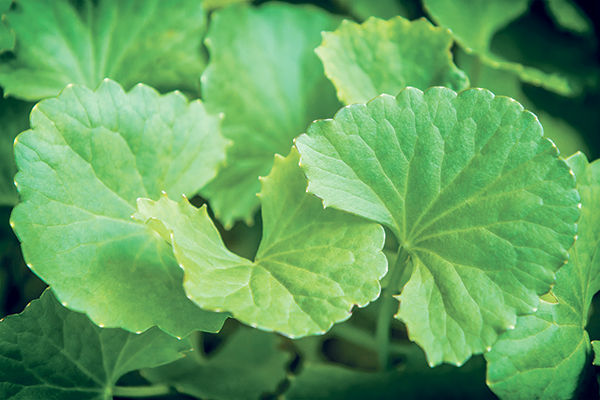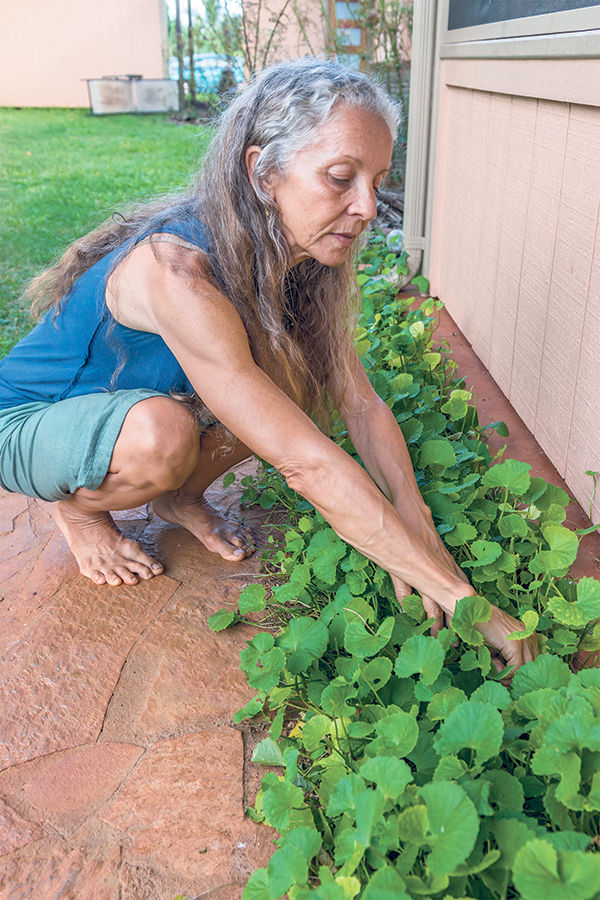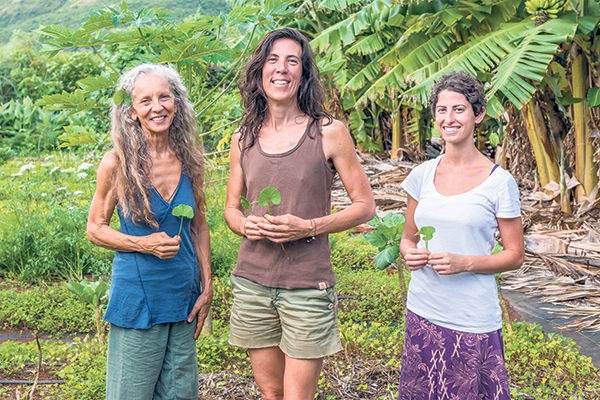Myra Lewin owns Durga Farms, a 4.3-acre farm in Anahola. Instead of using chemicals, the farm grows food using sustainable and permaculture techniques. Lewin, once a board member of Hawaii Organic Farming Association, became a vegetarian more than 30 years
Myra Lewin owns Durga Farms, a 4.3-acre farm in Anahola. Instead of using chemicals, the farm grows food using sustainable and permaculture techniques. Lewin, once a board member of Hawaii Organic Farming Association, became a vegetarian more than 30 years ago.
“She had to learn how to grow her own food back then, because it wasn’t the norm,” says Vanessa Massey, who is the farm manager and has worked with Lewin for 10 years.
Durga Farms grows food for Lewin’s wellness business. Hale Pule helps clients improve health and manage weight through yoga retreats and Ayurveda, the traditional Hindu system of medicine, which balances bodily systems through diet, herbal treatment and yogic breathing.
Lewin is the author of two books. “Freedom in Your Relationship with Food: An Everyday Guide” is designed to break unhealthy eating cycles. “Simple Ayurvedic Recipes” is a companion book filled with additional recipes. Both are available on the Hale Pule website.
What’s growing
Aalii (native Hawaiian shrub), apple banana, ashwagahnda root, asparagus, gotu kola (Brami), kale (curly and lacinato), pumpkin and shatavari root.
Gotu kola
There is powerful energy at Durga Farms, which is calming yet energizing, much like the health benefits of gotu kola. Also known as Centella asiatica, gotu kola is a perennial plant native to India, Japan, China, Indonesia, South Africa, Sri Lanka and the South Pacific.
Leaves and stems of the plant have been used medicinally for thousands of years. In India, it’s used to promote relaxation, improve memory and aid meditation. In traditional Chinese medicine, the herb is used for longevity.
According to the University of Maryland Medical Center, triterpenoids, the active compound in gotu kola, decreases anxiety and increases mental function in mice. Additionally, a single study of 13 women with scleroderma found that gotu kola decreased joint pain and skin hardening and improved finger movement.
Some clinical trials have studied the use of gotu kola in people with poor blood flow, usually in the legs. These studies suggest that gotu kola may help reduce swelling in the legs and feet, although more scientific studies are needed.
Typically, gotu kola is available in teas and as dried herbs, tinctures, capsules, tablets and ointments, but Durga Farms sells fresh leaves through Da Food Chain, an online grocery store that delivers Kauai grown produce to homes in Kapaa and Lihue.
Season: Gotu kola, a member of the parsley family, thrives in and around water and is especially sensitive to pollutants in water. Flowers are white or pinkish to red in color, born in small, rounded bunches near the surface of the soil. The crop matures in three months and is available year-round.
What to look for
Fan-shaped leaves are deep green, about the size of a quarter and are tender to the touch.
Storage
Da Food Chain sells a one-week supplies of fresh leaves in small paper bags. These bags can be placed in the refrigerator and will keep for up to a week.
Preparation
Stephanie Stillman, Durga Farms outreach coordinator, says adults should take up to two fresh leaves per day. The leaves are odorless and slightly bitter. They can be chewed, made into a tea or added to meals.
In Sri Lanka, gotu kola is minced and mixed with grated coconut, green chilies, turmeric, and citrus for a traditional accompaniment to rice, dhal and jackfruit or pumpkin curry.
Sinhalese use gotu kola in a nutritious porridge made with red rice and coconut milk. Leaves are added to salads in Indonesia and Malaysia and made into drinks in Vietnam, Thailand and Bangkok. In Bangladesh, it’s mashed and eaten with rice.
Health benefits
Historically, gotu kola has been used to treat syphilis, hepatitis, stomach ulcers, mental fatigue, epilepsy, diarrhea, fever and respiratory ailments such as colds and asthma.
Today in the U.S. and Europe, gotu kola is most often used to treat varicose veins and chronic venous insufficiency, a condition where blood pools in the legs. It’s also used in ointments to treat psoriasis and help heal minor wounds.
Tip
Gotu kola is generally considered safe; however there are no large clinical studies in humans to fully document side effects. High doses (more than 750 milligrams of extract a day) have been reported to increase blood sugar and raise cholesterol levels. Gotu kola impairs fertility in mice, but effects in humans are less known.
Gotu kola is not related to the kola (cola) nut and contains no caffeine or stimulants. Potential interactions between gotu kola and other drugs and herbs should be considered as some combinations may be dangerous. Always tell your doctor and pharmacist about any herbs you are taking.
Durga Farms’ produce can be found at:
For fresh leaves, order at DaFoodChain.com. Deliveries will be made to Kapaa and Lihue households only. For more information about Durga Farms or Hale Pule, call 344-3634 or visit www.HalePule.com
•••
Marta Lane has been a Kauai-based food writer since 2010. After graduating from a 12-week organic farming course on the North Shore, she became the farm’s Community Supported Agriculture manager. Marta is the author of “Tasting Kauai: Restaurants — An Insider’s Guide to Eating Well” on the Garden Island. For more information, visit www.TastingKauai.com.




